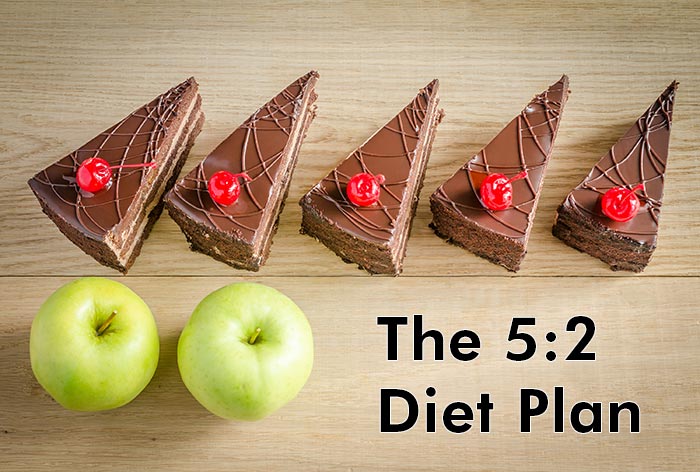Last Updated on December 6, 2016 by Marc Seward

I remember watching the BBCs Horizon documentary entitled ‘Eat, Fast and Live Longer’ back in 2012. It was this documentary which popularized the 5:2 diet and inspired a flurry of articles and books soon afterwards. Well known British doctor and Horizon presenter Michael Mosley declared the diet to be ‘genuinely revolutionary’ and was inspired to write ‘the fast diet book’ in 2013.
I am a sucker for a well-made Horizon documentary so I remember paying more attention than I would usually pay to yet another ‘diet’. When you consider that most diets tell us to watch what we eat and to make sure that we never, ever skip a meal then the 5:2 diet plan is certainly revolutionary. Being able to eat whatever you want most of the time with what sounds like a fairly easy to comply with restriction on just a few days a week sounds very appealing.
Compared with many diets that require calculators and spreadsheets to follow, the 5:2 diet is at least relatively simple to understand and its principles make a certain amount of sense at first glance. It is based on intermittent fasting where you retain normal eating habits most of the time and then fast at other times.
As its rather unimaginative name makes clear, the 5:2 diet is based on eating normally for five days of the week and fasting on the other two non-consecutive days.
The popularity of this diet probably owes a lot to the fact that unlike most diets, there are no limitations to what you can eat during normal days. However, you are expected to consume only 25% of your normal calorific intake on your fasting days which means 600 calories for men and 500 calories for women.
This is not a diet for those looking to lose weight in a hurry-according to proponents of the diet, women can be expected to lose around a pound a week and men are expected to lose slightly more. I think it is true that the majority of people are interested in diets for their weight loss effects but advocates of the 5:2 diet claim that besides reaching target weight, the diet imparts a number of other health benefits…..
- It extends your lifespan.
- It improves your immune system and protects against disease.
- It improves cognitive function and can protect against a number of common diseases associated with impaired cognition such as Alzheimer’s and dementia.
- Controls blood sugar and improves cholesterol levels.
It all sounds good doesn’t it?
You get thin, live longer and healthier both physically and mentally. But despite these lofty claims, there are some concerns not least of which is that the long term effects of intermittent fasting are not yet fully known.
While there has been little scientific research into intermittent fasting, people following the diet have reported a number of adverse side effects including fatigue, sleeping problems, bad breath, irritability and dehydration. Without further research then the severity and incidence of these side effects are very difficult to evaluate and there are equally as many if not more people who report that they have benefited from the diet.
So what do we know so far? Some research has been conducted into the diet’s effects and while it is limited it is worth taking a closer look at what the science has to say. While the present research is limited at present, the ever increasing popularity of intermittent fasting plans means we are likely to see more research into their effects in the future.

A study published in 2011 found that women who were put on the 5:2 diet lost similar amounts of weight as women who were put on a calorie controlled diet. Not only was the level of weight loss promising but perhaps more importantly the women on the 5:2 diet also experienced a reduction in biological markers which indicate a potential reduction in certain chronic diseases like diabetes. (1)
Another study carried out in 2012 suggested that the 5:2 diet may even help reduce the incidence of certain cancers related to obesity including breast cancer. (2)
As well as studying the 5:2 diet, researchers have also focused on other similar intermittent fasting plans which can certainly help us to understand the efficacy of the 5:2 diet. In one study published in 2012, 30 obese women with pre-existing heart disease risk factors were given a diet of low calorie meals for 6 days a week and required to fast on the other.
By the end of the eight week trial, the women had lost an average of 8.8 pounds in weight but it should be noted that these women were on a low calorie diet and they also had the motivation to stick with the plan. (3)
When it comes to extending your lifespan, nearly all of the evidence that we have is based on animal studies. In order to study its effect on humans, you would need decades of data so animals are all we have to go on so far and these have proved inconclusive.
As regards cognitive ability, again we have to make do with animal studies. According to research carried out on lab rats published in 2006, mice fed an intermittent fast diet demonstrated a slower cognitive decline compared to those given a normal diet. (4)
Another claim made by proponents of the diet is that it can prevent disease. Again there is scant evidence to prove these claims but a clinical review published in 2007 which looked at the effects of intermittent fasting on human subjects found that it might prevent heart disease, cancer and type 2 diabetes. (5) The researchers did however add the caveat that more research was necessary before they could confirm the efficacy of intermittent fasting.
What are the downsides?
- Many people report side effects especially on the first few weeks of fasting. These include loss of energy, trouble sleeping, dizziness and bad breath.
- After your fasting days, some people might find it difficult not to overeat.
- Fasting might cause extreme irritability and the concept of fast or feast seems a bit all or nothing to some. Making sure that you retain a sense of balance and eat a healthy diet on your non-fasting days is important. Eating normally does not mean eating absolutely anything that you want.
- For many people, it might not be a sustainable diet in the long term but then again most diets are difficult to stick with for a long time.
- While it is not out and out fasting, consuming as few as 500 calories on your fasting days might not be as easy as it sounds at first. Making sure that you feel sated during those days necessitates that you find a way to fill yourself with very few calories. Making sure that you fill up on low calorie fluids like water and green tea will help.
Precautions
- Pregnant and breastfeeding women should consult their medical professional before embarking on any diet especially one which includes fasting.
- Diabetics should seek medical advice first.
- Children and teenagers require nutrients for their development and growth so this type of diet may be unsuitable without taking great care regarding nutritional intake.
If you have been unsuccessful in following other diets in the past, I think it is worth giving the 5:2 diet a go. While you can expect to feel certain side effects to begin with, they do not appear to be overly severe and according to most people they will improve with time.
There are a number of forums on line which can help support you, give advice regarding side effects and offer fasting day plans and recipes.

If you are going to give this diet a go then good luck and let us know how it goes.
Willpower in a Bottle.
If you want a little help with your will power–Psyllium Husk can safely reduce hunger on the low calorie days. I have found this to be about the safest supplement for dieting. A natural fiber, Psyllium Husk adds bulk and expands in your stomach making you feel full. And you are getting fiber as well–which most diets are deficient in. For all the benefits of Psyllium Husk-check out this article we have about it.
Yo u can add it into oatmeal or porridge or just stir it in a glass of water. It is the main ingredient in Metamucil (they also add weird coloring and flavoring). If you use psyllium husk make sure to drink enough water with it. If you let it sit it will expand in the water glass–it is doing the same thing in your stomach.
Another great addition is glucomannan. It is a water soluable fiber with similar characteristics as psyllium husk. You can find out more information about glucomannan–in this article.
There is very good research using both psyllium husk and glucomannan for weight loss. A 2007 study in the British Journal of Nutrition found that subjects who took the combination of 3 grams of psyllium husk and 1 gram of glucomannan lost 10 pounds over a 16 week period. This is compared to only 1.7 pounds of the placebo group.
This is a great safe alternative to potentially dangerous stimulant supplements. These supplements also have the benefit of adding fiber to your diet for a rare win/win.
(1) http://www.ncbi.nlm.nih.gov/pmc/articles/PMC3017674/
(2) http://journals.cambridge.org/action/displayAbstract?fromPage=online&aid=8544422
(3) http://www.biomedcentral.com/content/pdf/1743-7075-9-98.pdf
(4) http://matsuokalab.georgetown.edu/pubs/2007%20Neurobiol%20Dis%20Caloric%20restriction.pdf
(5) http://ajcn.nutrition.org/content/86/1/7.full.pdf+html

Leave a Reply
You must be logged in to post a comment.